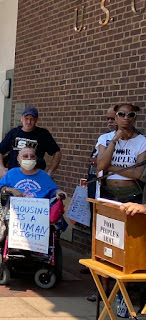The Fred Wickham Caravan’s debut album is about many things, but at its core is a loneliness so complete it’s delusional. In that sense, it’s a perfect record for the times we live in, particularly because it offers a way forward. The key here is community, and that means a great band like the Caravan, a diverse group of Kansas City’s best musicians so interwoven it feels wrong to try to parse the contributions.
But showing how the diversity adds up seems essential
to the point. Wickham’s longstanding bandmate bassist Richard Burgess and drummer
Matt Brahl serve up rhythms playful or jaunty or prowling or reflective (as on “One
for the Road,” a soft downbeat, brushes and a bowed sustain). Goading the
fearful townspeople in the title track, Fred Jr.’s mandolin and Bart Colliver’s
keys comprise another ring of interplay that will take various forms again and
again, trading piano for accordion and then organ. Marco Pascolini is certainly
the heart behind the searching steel on “If We Ever Happened,” but it’s a fool’s
game trying to tell whether Wickham or Pascolini’s imaginative guitar play is
responsible for any given cry or moan—all surprising, fresh and often painfully
sharp. The mix is inclusive by design, so every addition makes natural sense,
from Muscle Shoals musicians (guitar and horns) on “Just Because You Can” and “Fatbird”
or the Grand Marquis horns on “I Think I Just Fell In Love.”
That said, as strong a band album as this is, it is
focused around remarkable vocals. Perhaps at its most beautiful, “If We Ever
Happened” offers refrains with Colliver’s bold harmonies given an essential
aura by Muscle Shoals’ Angela Hacker, a subtle approach she builds upon in the story
of a woman lost on “What Happened to Me” (in contrast to the muscle she gives “Just
Because You Can”). There’s an audacity to the way Fred Wickham inhabits every
foolish breath of “That One Thing” and a seasoned knowingness to the warm
quaver he uses to rally the room on “One for the Road.” The first of the album’s
deepest gut punches, “Progress,” calls to mind John Prine, heartbreakingly
insisting we believe there’s hope in momentary forgetfulness and the ability to
hold it together at the sound of children playing.
“A Town without Soul” is a record
haunted. It’s yearning for something lost—everything thrown away in “That One Thing,”
a relationship shattered in “Breaking Your Heart,” and things the characters
aren’t even sure about—“If We Ever Happened at All” or “What Happened to Me.” The
town the singer must get shut of sells lies about safety and security
when the singers and the band know soul saving is messy, risky, scary as hell,
and, importantly, a lot of fun.
On this record, those singers offering “the same tired
songs” aren’t simply dull, they’re edging toward dangerous. When the band
shouts down “Fatbird” with a refrain of “Tweet, tweet,” it’s making a case for
the power in numbers. Everyone sings in what the liner notes call the Tweety
Bird choir, all by itself a raucous sound that's food for the soul.































